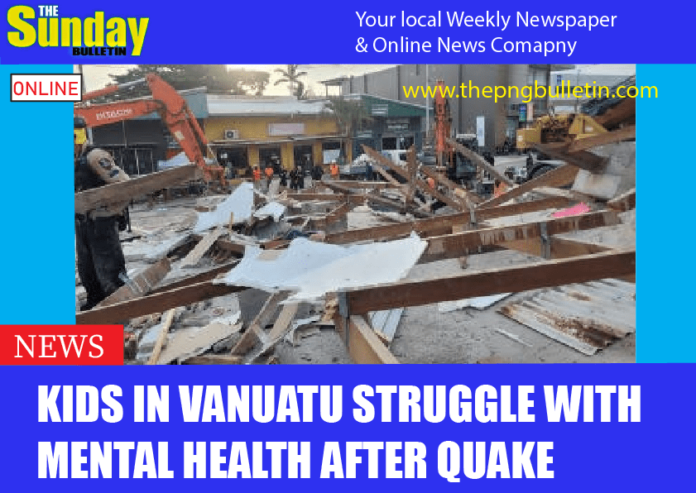AAP: AID workers want urgent mental health support for children in Vanuatu as they face fear and anxiety a week on from the devastating earthquake.
One week on from the devastating 7.3 magnitude earthquake that hit Vanuatu, aid workers are calling for urgent mental health assistance as children struggle with intense fear and anxiety and aftershocks continue to shake the region.
The earthquake, which claimed 14 lives and left over 200 injured, has displaced thousands, with the death toll expected to rise as recovery efforts reach isolated areas.
Ten-year-old Peter, whose name has been changed for privacy, is among those children struggling to process the events.
When the earthquake struck, he was playing with his nine-month-old brother in a separate part of the house to his mum.
“When the ground starts to shake I was really scared and didn’t know what to do,” he said.
“I held strong to my baby brother and waited for the moment to come where we both are going to die.”
The family managed to escape moments before the house collapsed.
Sixteen-year-old Walley narrowly escaped being in the Billabong store, which was destroyed during the quake and is now living with his extended family in makeshift tents.
“Some sleep in the house, but most of us sleep outside with blankets and mats,” he said.
“Here it’s an open space, so in case of an earthquake, there is no chance of things falling on you.”
Twelve-year-old Milana described the moment the earthquake struck.
“We ran outside and sat on the floor,” she said. “We were so shocked.”
Milana is now living in temporary shelter with her brother Walley.
“I don’t like it but it’s for our safety,” she said.
Heavy rainfall and frequent aftershocks, one as strong as 6.1 magnitude, have delayed recovery efforts, leaving little opportunity for children to begin their healing process.
“In any crisis, children are always the most vulnerable,” Save the Children Vanuatu acting Country Director, Lavinia Mahit-Wasinabani told AAP.
“Here in Port Vila children are anxious and are increasingly concerned about what the next few days, weeks and even months will look like.”
“Some children have told us they are too scared to enter buildings in case they collapse.”
Without early mental health intervention, Ms Mahit-Wasinabani warned children could see long term impacts on their education and wellbeing.
“We’ve deployed child-friendly spaces across multiple sites in Port Vila, including in evacuation centres,” said Ms Mahit-Wasinabani.
The spaces give children a protected environment where they can express themselves through organised activities that include playing, socialising and learning.
“One child shared, ‘I was scared running around after the quake thinking there would be another one that will crack the ground open, but after our short play, I realised I was actually playing again freely without worrying about a shake’,” Ms Mahit-Wasinabani said.
The next step is to get as many kids back to school as possible.
“We are currently assessing the impact of the earthquake on schools, but we know a number of them have been deemed unsafe to enter,” she said.
While these interventions provide relief, Ms Mahit-Wasinabani said continued support will be vital to help children and families rebuild their lives.
“So many of our families are struggling with trauma, even as they try to help each other.
“Tomorrow, many people around the world are celebrating Christmas, but I know for us here in Vanuatu, the feeling is one of deep sadness, along with a sense of gratitude.”

